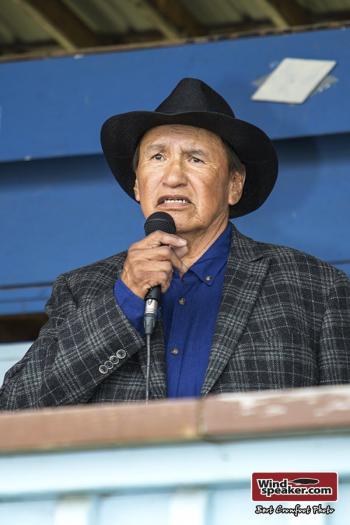Image Caption
Summary
By Shari Narine
Windspeaker Contributor
PAUL FIRST NATION, Alta.
After 17 years of having its money and decisions filtered through an Indigenous and Northern Affairs Canada-appointed advisor, the Paul First Nation is about to take back control.
The contract for appointed advisor Shirley Allder, with the band paying approximately $200,000 annually, expires April 1, 2018.
“We have to do everything to sustain ourselves now,” said Paul Band Chief Arthur Rain. “It’s a different line of thinking now. We have to try and create an opportunity or a window for our future generation…because if nothing is done today then it’s a very grim sort of perspective.”
It’s about improving governance, decision-making, maintaining the finances, developing long range plans and taking ownership for their own success, he says.
In 2008, the first step to get out of co-management was made with the hiring of a human resources officer. Rain, who has been chief for only 15 months, believes seven years was needed to take that initial step because other issues were prioritized.
“The reason we went into co-management was that we had such financial hardships, maybe they couldn’t afford HR,” he said.
At its peak, Paul Band had $4 million coming in annually from natural gas revenue and was able to spend $10,000 each day. But when the revenue started drying up, the spending did not end. The result was a First Nation that could not meet the needs of its members.
Now, with a newly-hired band manager, who has helped other bands get out of co-management, and a certified financial director, Rain is confident that new sources of revenue – which will supplement the band transfers from the federal government – can begin to be put in place.
He says discussions have begun with potential industry partners.
But before those new sources start flowing, Rain says, it’s obvious what chief and council must do to stay out of co-management: “We’ve got to be disciplined. We can’t spend money that we don’t have.”
Councillor Aaron Bird says band members also have an important role to play in allowing the First Nation to call its own shots.
He says members have to take advantage of training programs and social development offered by the band so they are competitive in the labour market, secure jobs with industry partners, and hold onto those positions.
Bird said he’s proud of being on the council that is working towards developing a sound plan for the next council.
“Exiting co-management leaves a clean slate for the next council to pick up and carry on and I think that’s really important,” he said. “Everybody who’s in leadership should have that mentality. That everything we do is not for today. It’s for tomorrow. The decisions we make are for the next generation.”
Rain says a celebration will be held to mark the occasion.
“We want to share with the community that if we collaborate on our efforts, we can do this. We can carry this on to other initiatives. If the community stayed together then we can accomplish other goals,” said Rain.
As of Jan. 2, 2018, six other bands in Alberta are in default management with INAC: Stoney Band, Sunchild First Nation, Little Red River Cree Nation, Montana Band, Sucker Creek Band, and Mikisew Cree First Nation Band.
In total, the INAC website says there are 147 First Nations operating under the Default Prevention and Management Policy.

